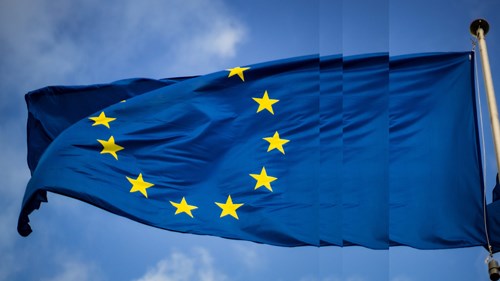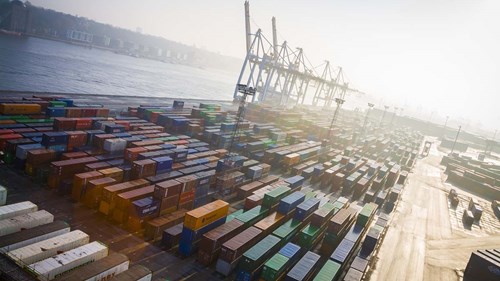Human rights supply chain requirements in the U.S.A.
Due diligence requirements in the supply chain – U.S. authorities can also place requirements on German companies.
German companies that maintain business relations in or into the U.S.A. should examine more closely their supply chains as to potential human rights abuses, particularly in regard to products/companies from China.
Background
On 13 July 2021, the “Xinjiang Supply Chain Business Advisory”, which includes guidelines and information on dealing with human rights abuses in the Chinese province Xinjiang, was jointly published by a total of six (6) U.S. agencies, the U.S. Department of State, the U.S. Department of the Treasury, the U.S. Department of Commerce, the U.S. Department of Homeland Security (DHS), the Office of the U.S. Trade Representative and the U.S. Department of Labor.
These agencies have the power to issue and/or enforce legally binding measures, which can include, for example, Withhold Release Orders (WROs) from the U.S. Customs and Border Protection (CBP), entry of companies or individuals into the U.S. Department of Commerce’s Entity List or List of Goods Produced by Child Labor or Forced Labor, visa restrictions and other sanctions by the Department of the Treasury.
Types of goods affected
The goods most often affected are raw and processed materials, commodities, intermediate products, by-products and recycling materials that are connected to forced labour and other human rights abuses in the Chinese province of Xinjiang, regardless of the final product or the region of origin or export. Those who trade in these products must take special risks into consideration. This also applies to cooperation with companies from the Xinjiang region or with companies that have connections to the region or use workers from the region.
What requires special attention from German exporters?
Consequently, German exporters that wish to import goods into the U.S.A. or (re)export them from there must complete a due diligence investigation in the form of a supply-chain assessment that includes human rights abuses. This refers primarily to goods and raw materials from China, but also to other countries that are discussed in more detail in the abovementioned guidelines.
As regards the Chinese province of Xianjing, the U.S. agencies list four main areas that entail risks of human rights abuses in supply chains:
- developing or investing in surveillance software or technology that the Chinese government uses in Xinjiang (including methods to collect and analyse genetic or biometric data),
- directly or indirectly procuring goods or workers from Xinjiang if there is or could be a connection to forced labour,
- delivering commodities, software or technology from the U.S.A. to companies that use the described surveillance methods or forced labour, and
- cooperating in the construction or operation of re-education camps (internment facilities) for Uyghurs and members of other Muslim minorities, or business locations in the direct vicinity of such camps that are suspected of using forced labour; this also includes deliveries of construction materials.
Lists of industries and companies
The U.S. government has also published a list of industries that – specifically in connection with the province Xinjiang – are exposed to the risk of the use of forced labour. The list is not exhaustive, but rather is intended to be understood as an additional risk factor in a comprehensive due diligence investigation regarding human rights abuses.
|
Industry |
|
Agriculture (including such products as raw cotton, hami melons, korla pears, tomato products, and garlic) |
|
Cell Phones |
|
Cleaning Supplies |
|
Construction |
|
Cotton, Cotton Yarn, Cotton Fabric, Ginning, Spinning Mills, and Cotton Products |
|
Electronics Assembly |
|
Extractives (including coal, copper, hydrocarbons, oil, uranium, and zinc) |
|
Fake hair and human hair wigs, hair accessories |
|
Food processing factories |
|
Footwear |
|
Gloves |
|
Hospitality Services |
|
Metallurgical grade silicon |
|
Noodles |
|
Printing Products |
|
Renewable Energy (polysilicon, ingots, wafers, crystalline silicon solar cells, crystalline silicon solar photovoltaic modules) |
|
Stevia |
|
Sugar |
|
Textiles (including such products as apparel, bedding, carpets, wool, viscose) |
|
Toys |
Additional indications and/or warning signs of forced labour in the region are
- a lack of transparency regarding product origin or production methods,
- a small number of employees of the company itself compared to its sales,
- any indication of (re-)education or training centres for the advancement of ethnic minorities,
- support from the Chinese government or the use of government staff recruiters,
- and all connections to the Xinjiang Production and Construction Corps (XPCC).
Attention must likewise be paid to the U.S. Department of Labor’s list of “Goods Produced by Child Labor or Forced Labor” and the U.S. Department of Commerce’s “Entity List” of companies and individuals whose activities constitute a potential national security risk. In addition, the CBP has issued Withhold Release Orders (WROs) regarding primarily cotton and tomato products with a connection to China.
Even in the financial sector, the due diligence investigation must include human rights because the Bank Secrecy Act includes not only provisions to combat money laundering and terrorism but also a reporting obligation regarding other criminal acts such as the use of forced labour.
When is a permit necessary? What documentation is necessary for this?
In general, the U.S. Customs and Border Protection (CBP) is the agency responsible for controlling imports to and exports from the U.S.A. It also monitors whether goods comply with applicable U.S. law and administers export licences for other agencies. The agency that is competent for an export licence in a specific case depends on the goods themselves. However, information regarding exporting can be submitted to a centralised “Automated Export System (AES)”. The CBP at the port of export is also the first contact for individual questions regarding specific licences.
Export licences
According to the Export Administration Regulations (EAR), a licence to export certain types of goods listed in the Commerce Control List (CCL) is necessary and/or restricts the (re-) export or transfer of American or foreign goods that are to be exported to certain destination countries or for a certain purpose for end consumers. In particular, EAR is concerned with purchasers and contracting counterparties whose activities could impair the national security or foreign-policy interests of the U.S.A.
An export licence is necessary for transactions involving any company that is listed in the “Entity List” (Supplement No. 4 to Part 744 EAR). Application for such an export licence, along with any other necessary licences regarding the destination country or use restrictions, is to be made at the Bureau of Industry and Security (BIS) of the U.S. Department of Commerce (See the information provided by the BIS). However, the BIS, i.e. the Department of Commerce, includes human rights considerations in its decision as to whether to grant such a licence. This can include a possible use of the goods for censorship, surveillance or excessive use of force.
Therefore, before (re-)exporting goods from the U.S.A., an exporter must consider whether the goods fall under special restrictions of the CCL, where their export destination is located, who the end consumer is and for what purpose the goods are intended to be used. The BIS recommends comparing the contracting counterparties to the Entity List as part of the due diligence investigation before the transaction.
Importing goods into the U.S.A.
When importing goods into the U.S.A., consideration must be given to the fact that, according to the Tariff Act (19 U.S.C. § 1307) it is prohibited to import goods that have been manufactured wholly or in part by forced or child labour. If the CBP (Customs and Border Protection) becomes aware of facts that could indicate a violation of this prohibition, the goods could be intercepted by means of WROs or even confiscated.
To document compliance with these requirements, a “certificate of origin” from the seller or manufacturer as well as a statement from the importer that satisfies the requirements of 19 C.F.R. § 12.43(a) and (b) must be shown. Standard wording for the certificate is found in the law; this wording is to be followed as closely as possible. If a shipment of goods is intercepted, these documents are to be sent to the port of entry where the goods are being held.
To avoid risks in connection with forced labour, the CBP recommends using the following resources (See Xinjiang Uyghur Autonomous Region WRO FAQs):
- the Department of Labor’s Comply Chain App;
- the Department of Labor’s List of Goods Made by Child Labor or Forced Labor;
- the Department of State’s Trafficking in Persons Report; and
- the Xinjiang Business Advisory.
What are the risks of non-compliance?
Companies or individuals that do not comply with the requirements of export restrictions or the EAR are subject to fines or prosecution imposed by the Department of Commerce. The CBP can also issue a WRO or prohibit the import of goods. This can cause significant delays and hindrances in the transport of goods. In some cases, goods can even be confiscated and sold. In addition, there are specific federal criminal laws prohibiting forced labour and human trafficking (See for example Federal Acquisition Regulation, Combating Trafficking in Persons (FAR 52.222-50) and Trafficking Victims Protection Act’s Crime of Forced Labor (18 U.S.C. § 1589)); the Department of Homeland Security can investigate companies that profit from forced labour, even if the violation occurs outside the U.S.A. Class action suits are currently pending against Tesla, Apple and other well-known U.S. companies brought by parents whose children were killed or seriously injured while working in Congolese cobalt mines. Such lawsuits are not limited to companies domiciled in the U.S.A. Thus, it is possible for German companies to be prosecuted for violations along the supply chain if the goods are to be exported to the U.S.A. Such prosecution can be based on not only knowledge of the use of forced labour, but even mere grossly negligent lack of such knowledge. This makes it crucial to conduct a comprehensive due diligence investigation including human rights all along the supply chain.
Companies can be faced with fines of up to $500,000, and board members or employees with imprisonment for up to 20 years. Compensation of victims can also be ordered. Companies that have knowingly or carelessly profited from forced labour are also subject to civil-law damages claims.
Legal situation in Germany
Experts consulted during the legislative process of the German Supply Chain Due Diligence Act (Lieferkettensorgfaltspflichtengesetz – LkSG) requested that the authorities likewise establish and maintain either black lists (lists of prohibited companies) or white lists (lists of reliable suppliers) as orientation for German companies. However, the legislature did not expressly include this in the wording of the law. It remains to be seen whether the German authorities will publish similar lists. The primary responsibility for this would fall to the German Federal Office for Economic Affairs and Export Control (Bundesamt für Wirtschaft und Ausfuhrkontrolle – BAFA) in Berlin, which section 19 LkSG assigns to monitor the obligations arising from the law. According to section 20 LkSG, BAFA is to provide cross-sectoral and sector-specific information, as well as aids and recommendations regarding compliance with this law. BAFA’s first draft is eagerly awaited.










